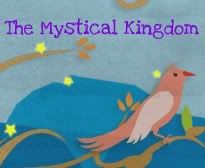Not too long ago, Michael's was having a sale and my husband had the afternoon off, so I got to go alone. In their floral section I found little "nests" and birdhouses, which didn't really look like functioning bird houses, but were made of wood and covered with moss, etc..
I purchased several items and kept the bag hidden in the car until they went to their grandmother's and I again had some free time. I carefully placed all of the items I had found all over the backyard, into hiding places within the bushes, on branches, etc...
Some they discovered right away, some are still awaiting discovery. It was interesting to watch from my window and see how they reacted when they suddenly made a discovery - precious!
It was also interesting to see what had happened to the ones who sat in the elements for weeks - how they became a part of the landscape and truly came to look like fairies had moved into them! It was an idea which has brought many hours of joy to my children...
All back yards have the potential for great discovery and activities. You should try to keep the area as natural as possible, and yet have a variety of "tools" on hand. These would include any of the following: a place for digging, a vegetable or flower garden, some wild growing plants (vines, wildflowers) wind chimes, windsocks, wind wands, pinwheels, prisms to catch the sun, gazing balls, a bonfire pit (obviously with supervision), planting sunflower houses or bean tents so children can experiment with light and dark, a water table, watering cans, seeds, potting soil and pots, scraps of wood (no nails!) for building, a long log for a balance beam, a hammock or comfortable chair, tree stumps which could be used for chairs & tables, cotton gauze cloths which could dirty, clothes pins or play clips, ropes, etc...
Simple Garden Magic:
Additionally, keeping a garden is a large part of the Waldorf curriculum. Even if you have an apartment in the city - try to keep a window box of herbs for your children. they will love it. It's also fun to take a drive out to local farms and farmer's markets.
Steiner said:
"Although it may seem absurd, it must be stated that a person who has not learned to distinguish an ear or rye from an ear of wheat is no complete human being. It can even be said that a person who has learned to distinguish between rye and without having observed them growing in the fields, has not attained the ideal. As teachers we should avoid going on botanical expeditions to collect specimens to be shown in the classroom. The children themselves should be taken out and wherever possible, be brought to understand the plant world in its actual connection with the earth, with the rays of the sun, with life itself. Through this we can find the transition in a quite naive way to something else which is very important."








No comments:
Post a Comment
We love hearing from you.....